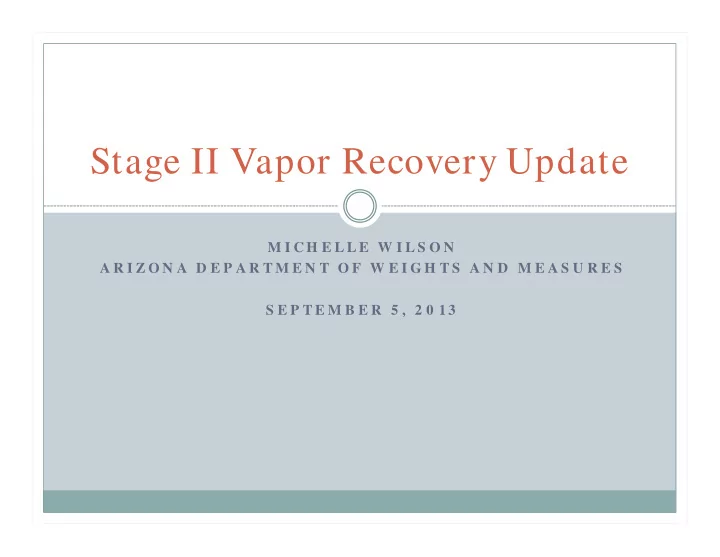

Stage II Vapor Recovery Update M I CH E L L E W I L S O N A R I Z O N A D E P A R T M E N T O F W E I G H T S A N D M E A S U R E S S E P T E M B E R 5 , 2 0 13
Agenda Background Update on SIP Overview of proposed statutory changes Decommissioning process
Overview Source: California Air Resources Board
Background EPA widespread use determination Stakeholder meeting November 30, 2012 Response to workshop comments February 19, 2013 On AZDWM website
Proposed Schedule Action Anticipated Date Prepare and submit the SIP revision removing the Stage II program from the January to December 2013 SIP Modify the applicable statute(s) requiring the use of Stage II vapor January to September 2014 recovery equipment EPA Review/Approval of SIP January 2014 to July 2015 Modify rules to reflect decommissioning of Stage II and requirements for January 2014 to July 2015 remaining Stage I systems Decommission Stage II equipment January 1, 2016 to December 31, 2017
Overview of MAG 20 13 SIP Revision to Rem ove Stage II Controls Clean Air Act Section 110(l) requires that the removal of Stage II controls cannot interfere with attainment of the ozone standard Beginning in 2018, Stage II controls no longer provide areawide emission reductions Removal of Stage II controls is proposed for new gasoline dispensing stations beginning in 2014 and for all stations beginning in 2016 (must be approved by EPA prior to implementation) Federal emissions standard for portable fuel containers (gas cans) used as an offset for Stage II benefits in years 2014-2017 Total mobile source emissions still decline each year after 2013 despite removal of Stage II controls
Tentative Schedule for MAG 20 13 SIP Revision to Rem ove Stage II Controls September 20, 2013 – Draft revision available for public review October 21, 2013 – Public hearing October 24, 2013 – MAG Air Quality Technical Advisory Committee recommendation November 6, 2013 – MAG Management Committee recommendation December 4, 2013 – MAG Regional Council adoption of the revision December 6, 2013 – MAG submission of the revision to ADEQ and EPA
Proposed Legislative Changes Legislation needed to remove Stage II Draft legislation for next session Remove Stage II requirements as approved by EPA, while preserving Stage I requirements
Installation Current statute requires Installation of CARB-approved Stage I/ II equipment; or Equipment tested and approved by an independent third party Proposed future revision: Remove references to Stage II Effective 2014 or when approved by EPA for new stations Stage I equipment – status quo Savings for new stations- $20,000 - $55,000 per station
Repair/ Replacem ent Savings Remove references to Stage II equipment. Maintain CARB-certified equipment for Stage I. Cost for Hanging Hardware Conventional vs Stage II (Per Nozzle) Conventional Cost Stage II Cost ($) Stage II Cost ($) Stage II Cost ($) Component ($) Vapor Assist Balance Healy Nozzles 50 190 140 380 Primary Hose 30 105 190 135 Whip Hose 12 55 60 90 Breakaway 65 110 110 125 Total 157 460 500 730 Price depends on equipment/ contractor, does not include labor costs
Additional Savings Annual testing of Stage II equipment will no longer be required after decommissioning Cut down on testing time and time site is shut down Maintenance fees associated with vapor recovery failures
Other General Requirem ents Retain Stage I vapor recovery requirements in areas A and B Retain annual testing of Stage I vapor recovery in area A Require AZDWM to establish rules for capping and closing Stage II vapor recovery systems
Proposed Decom m issioning Process To be developed during rulemaking Ample notice prior to decommissioning so stations can prepare and budget By station license number (BMF Number) 50% during 2016, 50% during 2017 During same month as annual test AZDWM to witness/ inspect post testing Scheduled utilizing Vapor Recovery Scheduler that Registered Vapor Representatives (RSRs) already use
Proposed Decom m issioning Process Cont… Petroleum Equipment Institute Recommended Practice (PEI/ RP300-09) Relieve pressure in tank ullage Drain liquid collection points Disconnect and drain vacuum motors / reprogram dispensers Disconnect and seal below-grade vapor piping at dispenser Disconnect and seal vapor piping at tank top Only if can be done without excavation Replace hanging hardware Remove Stage II operating instructions from dispensers Conduct testing to ensure Stage I is working properly Checklist to be completed by RSR
Com m ents Requested 41-2131(A) currently requires use of vapor recovery equipment certified by California Air Resources Board (CARB) as of March 31, 2001 ,or after that date. Certified before March 31, 2001 = Pre-EVR equipment Certified after March 31, 2001 = EVR equipment EVR equipment certified with higher vapor control Comments Requested: Should new stations and stations with major modifications be required to install Stage I Enhanced Vapor Recovery Equipment?
CARB EVR Executive Orders
Why Require Stage I EVR at New/ Modified Sites? Many, if not most, install Stage I EVR equipment Estimated cost difference between $600-800 per tank If EVR is required in future as an ozone control, sites from 2014 to that time will already have equipment, preventing the need to break concrete for retrofits
Conclusion MAG is on schedule for SIP submittal by end of the year AZDWM is on schedule for statute revision next legislative session New sites – Stage II not required 2014 or after EPA approval, whichever later Existing sites – decommission 2016/ 2017 Rule development to begin 2014
Questions/ Com m ent Michelle Wilson Arizona Department of Weights and Measures 602-771-4933 mwilson@azdwm.gov www.azdwm.gov
Recommend
More recommend